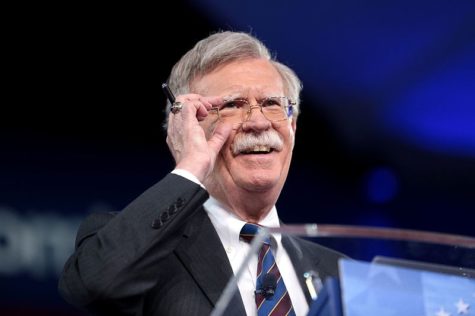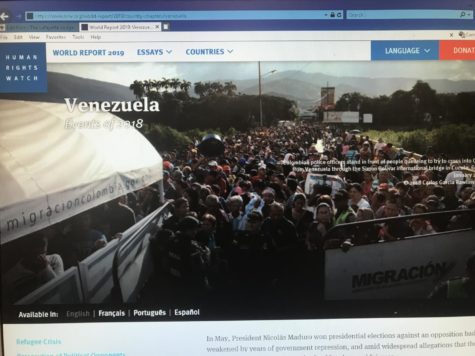Venezuela: Another Worthless Intervention
With the Trump administration pushing for military intervention in Venezuela, we should ask an important question: Is it worth it?
By Tasnim News Agency, CC BY 4.0, https://commons.wikimedia.org/w/index.php?curid=47896520
Nicolas Maduro, the controversial leader of Venezuela, is under very uncertain times.

Ever since the end of World War II, the US has maintained its position as a world super power. This is mainly due to the US having extremely strong influence on the global economy and the astronomical size of the US military. Some say that such power has ushered in an era of peace, with the United States acting as the world police. However, while the US has had some success in regards to foreign policy over the last 80 years; there have also been immense failures of US militarism. After military interventions such as Vietnam, Iraq, and Libya, one would think that our government would learn from its mistakes; but alas, they haven’t. Even after many lessons from the past, the Trump Administration is attempting to overthrow the current Venezuelan president, Nicolas Maduro. Before we get into why the US should not intervene in this Latin American country, it is important to understand the history of both Venezuela and previous US military interventions.
In the past, the US government has used the CIA, and occasionally, the full force of the US military, to influence foreign governments. One prime example of such is the Iraq War. After our country was put in shock due to the horrific attacks on 9/11, the Bush administration went into full propaganda mode to push for a new war against Saddam Hussein’s regime in Iraq. 16 years later, even after Saddam was tried and executed for war crimes, we are still in Iraq and dropping trillions of dollars on it. The saddest part of it is that this was not an isolated incident. In 1953, the CIA led an operation to overthrow the democratically elected leader of Iran, Mohammad Mosaddegh, and replaced him with a US and British-backed leader that served their interests. These foreign interventions have been extremely costly to the US taxpayer, and the general stability of the Middle East.

The other part of this story is Venezuela itself. Venezuela used to be one of the wealthiest countries in South America with its extremely large oil reserves and free market innovation. This era of prosperity ended with the election of Hugo Chavez, a self-proclaimed socialist. Chavez promised that he would reduce income inequality and provide for all Venezuelans. His various socialist policies worked for quite a while, as he tied the programs to the sales of Venezuelan oil. After Chavez’s death, Nicolas Madura was elected and continued Chavez’s policies and idea of being “The Man of the People”. However, oil prices eventually took a large hit, which started the crippling of Venezuela’s economy. The Maduro administration took very reactionary measures, such as printing even more money and implementing price control. These policies only made the Venezuelan economy even worse, causing people to wait hours in line for little amounts of food, and extreme civil unrest. Responding to the current state of the country, Ethan Quick, a senior at Lafayette High School stated “I think we should go there with full military force, as Maduro isn’t even accepting aid from the US”.

Due to these conditions in the country, President Trump and his administration are pushing for US intervention in the South American country. They claim that Maduro is a ruthless dictator and needs to be thrown out of power for the well-being of the Venezuelan people. However, there’s more than meets the eye in this situation. Due to the US’s track record with foreign interventions, it’s perfectly reasonable to question the government’s motives here. As stated before, Venezuela has some of the largest oil reserves in the world, and since the oil industry there is state run, big energy companies such as BP and Exxon-Mobil do not have access to those reserves. As seen in Iraq, oil production from those companies shot up after the US invaded, showing the partial motivation for overthrowing the Iraqi government. “This comes as no surprise to me, the US has always had ulterior motives when it comes to foreign policy,” said Markus Terhorst, a senior at Lafayette High School.

Shady motives aside, there is a strong fiscal and moral argument as to why the US should not intervene in Venezuela. For starters, it would be a very pricey affair. The Iraq war is expected to cost 7 trillion when it is over (if it ever ends) and the war in Afghanistan has costed 2 trillion. With our government running trillion dollar deficits and 20 trillion dollar debt, we really do not need to add another war to the bill of the American tax payer. Next up, we cannot afford another Vietnam War. That was is looked back on as a crap stain of American history, and rightfully so. We wasted American lives in a 3rd world country that we had no business being in to begin with. If we were to get militarily involved in Venezuela, we would waste even more American lives in, what is frankly, a stupid, useless, immoral war. As one can easily see, the US has no business repeating its former mistakes, as it will be us, the hard working citizens of this beautiful country, paying the price for mistakes of the elite in our government.



